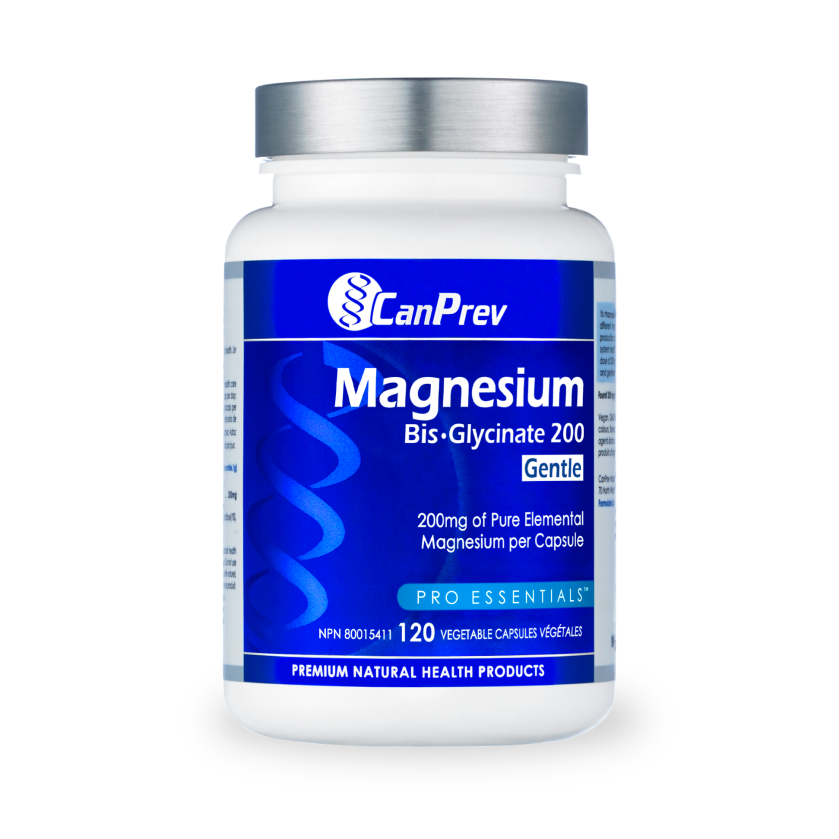Magnesium’s role in healthy aging
Prioritizing a well-rounded diet has always been important for our overall wellbeing, but even more so as we age. Along with physical changes like wrinkles and achy joints, it’s natural to see a decline in nutrient levels as well. This includes magnesium, an essential mineral that’s involved in over 800 enzymatic reactions within the body. With magnesium playing such a vital role in our health, making sure your body has sufficient levels of this multitasking mineral can help support you in the long run.
Read on to learn more about why magnesium deficiency is common, its role in healthy aging and ways to ensure you’re getting enough.
Why is magnesium deficiency common in the aging population?
As we age, research shows that the body’s ability to absorb magnesium from dietary sources naturally declines. It’s also common to see an increase in the urinary output of magnesium as we get older. This may be one of the reasons that magnesium deficiency is common in the aging population.
Additionally, factors like decreased kidney function, gastrointestinal issues and other health conditions, along with certain medications to treat these conditions, can impact magnesium absorption and retention within the body. Since magnesium is involved in numerous processes within the body, it’s safe to say that we would feel the impacts of a deficiency in the mineral.
Let’s take a closer look.
Magnesium and the hallmarks of aging
Each of the 12 hallmarks of aging contributes to the aging process in a different way. They can help us understand the biological reactions that happen within the body that result in the changes we see as we age. Research suggests that magnesium can help support each hallmark due to its vast role in our overall wellbeing. Let’s dive into magnesium’s role in the first five hallmarks.
Magnesium’s role in the first five hallmarks
- Genomic instability
What is it: Genomic instability is an accumulation of damaged DNA structures caused by oxidative stress and environmental factors, leading to mutations and cellular dysfunction. Since genomic instability builds up over time, its effects may not be immediately obvious, but can contribute to long-term health issues like the Hutchinson-Gilford and the Néstor-Guillermo progeria accelerated aging syndromes.
Magnesium’s role: Magnesium is a cofactor in DNA replication and repair, meaning that adequate intake of this mineral can help protect our DNA against damage and keep cells functioning properly.
2. Telomere attrition
What is it: Telomeres are repetitive sections of DNA sequences that act as protective caps on either end of our chromosomes. They naturally shorten over time, leading to cellular aging and dysfunction. A lack of sufficient telomeres is said to be associated with the premature development of conditions like pulmonary fibrosis, aplastic anemia, and more.
Magnesium’s role: Magnesium influences the structure and function of telomeres as well as the proteins that help them bind to our chromosomes. Sufficient magnesium levels may help support telomeric structure and integrity, ultimately maintaining telomere length and slowing down cellular aging.
3. Epigenetic alterations
What is it: Your genes have epigenetic markers that act like light switches to turn specific markers on and off. Over time, things like diet, lifestyle factors, or environmental surroundings, can alter or modify the position of these markers, causing a change in cellular function.
Magnesium’s role: Magnesium plays a role in regulating gene expression, which can influence the cell’s production of specific proteins that directly impact our wellbeing. In other words, magnesium can help reduce harmful changes that can eventually lead to chronic conditions like cardiovascular disease.
4. Mitochondrial dysfunction
What is it: Our mitochondria are the energy-producing powerhouses of our cells. With age, it’s natural to see an accumulation of dysfunctional mitochondria, which decreases our energy production and increases the number of free radicals within the body. Our mitochondria are so important to maintaining our overall health, that a dysfunction can impact our lifespan and vitality.
Magnesium’s role: Magnesium is essential for energy production and protects mitochondria from oxidative stress caused by free radicals. This can help in improving energy levels and reducing cellular aging.
5. Loss of proteostasis
What is it: Your body makes proteins that help it function properly. Processes like protein synthesis, folding, disaggregation and degradation all help maintain a healthy balance of proteins within the body. When there’s a loss of balance in protein maintenance, it can lead to the accumulation of misfolded or damaged proteins. This can contribute to conditions like Alzheimer’s and Parkinson’s disease.
Magnesium’s role: Magnesium is a cofactor for various enzymes that are involved in protein maintenance. A deficiency in magnesium can lead to impaired protein function and the accumulation of misfolded proteins, contributing to the loss of proteostasis.
Long-term benefits of magnesium supplementation
While we may not be able to prevent aging altogether, there are a few things we can do to support our bodies as we navigate the ongoing changes, starting with nutrition. In addition to continuing to eat magnesium-rich foods like leafy green veggies, legumes, avocados, and more, magnesium supplementation can help ensure your body is getting all the magnesium it needs.
Cardiovascular health
Magnesium can help keep your heart healthy and strong. Research shows that magnesium supplementation can help reduce blood pressure levels. Another study found that supplementing with magnesium improved multiple risk factors for heart disease, including triglyceride, cholesterol, and systolic blood pressure levels.
If you’re looking to increase your magnesium intake, try reaching for CanPrev’s Magnesium Cardio + Taurine, B6 and Zinc. This formula provides a therapeutic 75mg of magnesium bis-glycinate with added 450mg of Taurine, 25mg of vitamin B6, and 2.5mg of zinc for cardiovascular support. It’s designed for those looking to maintain proper heart muscle function.
Bone health
You may have heard that vitamins D and K2 help support bone health. But magnesium is a crucial mineral as well because around 50-60% of the body’s magnesium is found in the bones, making it a key player in protecting against bone loss. In fact, some studies have found that there may be a link between lower levels of magnesium and a higher risk of osteoporosis, which is a condition that causes bones to become weak and less dense.
CanPrev’s Magnesium + Vegan D3 & K2 is a vegan formula designed to help maintain healthy, strong bones. It features 250mg of magnesium bis-glycinate, 100IU of vitamin D3, and 129mcg of vitamin K2 per dose.
Cognitive function and sleep schedules
Magnesium also plays a role in supporting our cognitive health and sleeping patterns. This is because of magnesium’s role in regulating neurotransmitters like serotonin, dopamine, and gamma-Aminobutyric acid (GABA). While serotonin and dopamine can help improve our mood, GABA is responsible for things like motor control, vision, the stress response, and powering down when it’s time for bed.
Research has shown that increasing your intake of magnesium may help to treat sleep problems and improve sleep quality. One study on older adults with insomnia found that magnesium supplementation reduced the amount of time it took people to fall asleep by around 17 minutes. If you’re looking to increase your magnesium intake, CanPrev’s Magnesium + GABA & Melatonin is designed to help people relax, reset their circadian biological clocks, and get better sleep. This formula features a therapeutic dose of 125mg of magnesium bis-glycinate, 100mg of GABA, and 2.5mg of melatonin in every vegetable capsule.
Inflammation and aging
“Inflammaging” is a type of inflammation that happens as we get older. While acute inflammation is vital to help our body heal, chronic inflammation can trigger a variety of conditions like Alzheimer’s disease, arthritis, type 2 diabetes, cardiovascular disease and cancer – all of which tend to be more common as we age. Research suggests that inflammaging may be why we’re more likely to develop these chronic conditions with age.
Magnesium has been shown to help fight inflammation by reducing various markers of inflammation. This study concluded that magnesium supplements decreased levels of C-reactive protein (CRP), a marker of inflammation, in people with chronic inflammation. Studies have also found that magnesium supplementation may reduce other markers of inflammation including interleukin-6.
Personalizing your magnesium supplementation
Since magnesium plays such a significant role in our overall health, assessing our magnesium intake can help us determine whether supplementation can help. A visit to your healthcare practitioner along with a blood test can help give you a better understanding of your magnesium levels.
When it comes to choosing the right magnesium supplement for you, it all depends on your personal preferences and unique health needs. At CanPrev, we understand that everyone has different preferences and goals, so we’ve formulated a wide variety of options. In addition to capsules, powder and liquid formats, we also offer three different types of formulations of Magnesium Bis-Glycinate (a highly absorbable form of magnesium):
- Gentle: Features a fair balance of potency, gentleness and absorption, this formulation is ideal for most people.
- Extra Gentle: Designed for those seeking potency with enhanced gentleness, this formulation delivers more glycine to ensure magnesium absorption in spite of digestive issues. It’s ideal for those with sensitive digestion, IBS or weak stomach acid.
- Ultra Gentle: This formulation offers the most glycine to ensure gentle absorption and resistance to insoluble substances. It’s ideal for those with multiple prescriptions or digestive conditions like Crohn’s disease and colitis.
Check out all our magnesium options here.
Aging is a natural part of life, and while we may not be able to stop the processes from happening, we can support our body with adequate magnesium intake. Next time you’re at your doctor’s appointment, take a moment to assess your magnesium levels and consider incorporating more magnesium-rich foods or high-quality supplements into your daily routine!
Sources:
Magnesium in Aging, Health and Diseases
Hypomagnesemia (Low Magnesium)
Magnesium & Aging
10 Magnesium-Rich Foods That Are Super Healthy
12 Evidence-Based Health Benefits of Magnesium
An update on magnesium and bone health
Effect of magnesium supplementation on type 2 diabetes associated cardiovascular risk factors: a systematic review and meta-analysis
Effectively Prescribing Oral Magnesium Therapy for Hypertension: A Categorized Systematic Review of 49 Clinical Trials
Magnesium and the Hallmarks of Aging
Hallmarks of aging: An expanding universe
The Hallmarks of Aging
Your 5-Minute Read on Inflamm-aging and How to Prevent It
Inflammageing: chronic inflammation in ageing, cardiovascular disease, and frailty
Effect of Magnesium Supplementation on Plasma C-reactive Protein Concentrations: A Systematic Review and Meta-Analysis of Randomized Controlled Trials
Effect of magnesium supplements on serum C-reactive protein: a systematic review and meta-analysis
One week of magnesium supplementation lowers IL-6, muscle soreness and increases post-exercise blood glucose in response to downhill running
Oral magnesium supplementation for insomnia in older adults: a Systematic Review & Meta-Analysis





